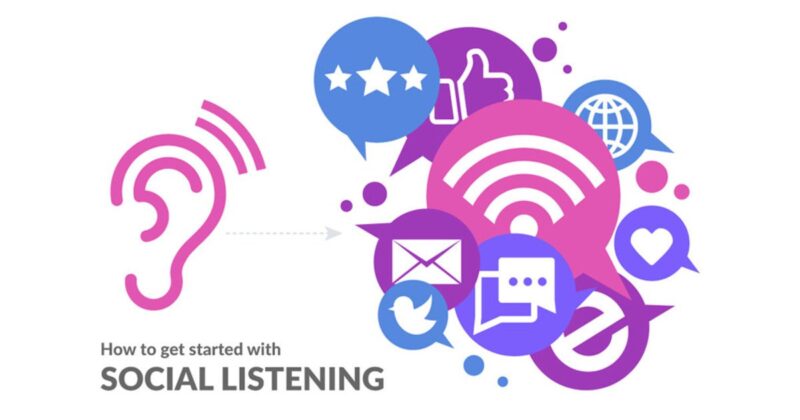Social media has become a crucial component of our everyday existence. Whether it’s scrolling through our newsfeeds, liking and sharing posts, or engaging in online conversations, social media has transformed the way we communicate and interact with each other. For businesses, social media provides a unique opportunity to reach out to their target audience and build strong relationships with them. However, to be successful on social media, it’s not enough to post content and hope for the best. You need to actively listen to your audience and understand their needs and preferences. This is where social marketing listening comes in.
What is Social Marketing Listening?

Social marketing listening is the process of monitoring and analyzing conversations and interactions on social media platforms to gain insights into your target audience. This involves tracking mentions of your brand, monitoring industry keywords and trends, and keeping an eye on what your competitors are doing.
Also, by listening to what people are saying about your brand and industry, you can identify opportunities to engage with your audience, address any concerns or issues they may have, and develop content and campaigns that resonate with them.
Why is Social Marketing Listening Important?

Social marketing listening is crucial for several reasons:
- Understanding Your Audience: By paying attention to the conversations surrounding your brand, you can gain valuable insights into their likes, dislikes, and pain points. This can help you tailor your messaging and content to meet their needs and preferences better.
- Reputation Management: Monitoring your brand mentions can help you address any negative comments or reviews before they escalate into a larger issue. By responding to negative feedback in a timely and professional manner, you can demonstrate your commitment to customer service and build trust with your audience.
- Competitive Analysis: By monitoring your competitors’ social media activity, you can gain insights into their strategies and tactics. This can help you identify areas where you can differentiate yourself and gain a competitive advantage.
- Content Development: By understanding what topics and trends are resonating with your audience, you can develop content that is more likely to be shared and engaged with. This can aid in expanding your social media presence and enhancing your visibility.
Key Components of Social Marketing Listening
Social marketing listening comprises several key components, each playing a crucial role in gaining actionable insights.
1. Social Media Monitoring
Monitoring social media platforms such as Twitter, Facebook, Instagram, and LinkedIn for mentions of your brand, products, or relevant keywords.
2. Sentiment Analysis
Analyzing the sentiment behind social media mentions to understand how customers feel about your brand and identify areas for improvement.
3. Competitor Analysis
Monitoring competitor activity and sentiment to identify strengths, weaknesses, and opportunities in the market.
4. Trend Analysis
Identifying emerging trends and topics of discussion within your industry to inform marketing strategies and content creation.
Social Marketing Listening Tools
Several tools and platforms are available to streamline the social marketing listening process.
1. AIM Insights
AIM Insights is an advanced social listening tool that offers in-depth analytics and insights, including sentiment analysis, trend detection, and influencer identification.
2. Mention
Mention is a comprehensive social media monitoring tool that allows brands to track mentions, analyze sentiment, and monitor competitor activity.
3. Hootsuite
Hootsuite is a popular social media management platform that offers social listening capabilities, allowing brands to monitor conversations, schedule posts, and analyze performance metrics.
4. Sprout Social
Sprout Social is a social media management platform that includes social listening features, such as keyword monitoring, sentiment analysis, and competitor tracking.
How to Get Started with Social Media Listening?

Here are some steps to get started with social marketing listening:
- Identify Your Goals: What do you hope to achieve through social marketing listening? Are you looking to understand your audience better, monitor your brand reputation, or keep an eye on your competitors? Establishing precise objectives will assist you in concentrating your efforts and evaluating your accomplishments.
- Choose Your Tools: There are a variety of social media monitoring tools available, ranging from free options like AIM Technologies and Hootsuite to more advanced options like Brandwatch and Sprout Social. Select a tool that fulfills your requirements and fits within your budget.
- Set Up Your Searches: Once you have your tool in place, set up searches for your brand name, industry keywords, and competitor mentions. This will help you keep track of relevant conversations and identify opportunities to engage with your audience.
- Analyze Your Results: As you start to gather data, analyze your results to identify trends and insights. Look for patterns in the types of conversations people are having about your brand and industry, and use this information to inform your social media strategy.
- Take Action: Finally, use your insights to take action. Engage with your audience by responding to comments and questions, address any negative feedback professionally, and develop content that speaks to their needs and preferences.
Benefits
Social marketing listening offers a wide range of benefits for brands looking to improve their online presence and engage with their audience effectively.
1. Customer Insights
By listening to what customers are saying about your brand, products, and industry, you can gain valuable insights into their needs, preferences, and pain points.
2. Crisis Management
Social marketing listening allows brands to detect and address potential crises or negative sentiments before they escalate, helping to protect brand reputation.
3. Brand Reputation Management
By actively monitoring and responding to mentions and conversations about your brand, you can maintain a positive brand image and build trust with your audience.
4. Competitive Intelligence
Social marketing listening enables brands to keep tabs on competitor activity and sentiment, helping them identify opportunities and stay ahead of the competition.
Challenges and Limitations
While social marketing listening offers numerous benefits, it also comes with its own set of challenges and limitations.
1. Data Overload
With the sheer volume of data generated on social media platforms, it can be overwhelming to sift through and analyze all the mentions and conversations.
2. Accuracy of Insights
Automated sentiment analysis tools may not always accurately capture the true sentiment behind a mention, leading to misinterpretation of data.
3. Privacy Concerns
Monitoring and analyzing public conversations on social media raise privacy concerns, particularly regarding the collection and use of personal data.
Tips for Successful Social Media Listening
To maximize the effectiveness of social marketing listening, consider the following tips:
1. Stay Updated with Trends
Keep abreast of industry trends, changes in consumer behavior, and emerging topics of discussion on social media platforms.
2. Utilize Automation Wisely
While automation can streamline the social marketing listening process, it’s essential to balance automation with human oversight to ensure accurate insights.
3. Engage with Your Audience
Don’t just listen; actively engage with your audience by responding to mentions, answering questions, and soliciting feedback.
Case Studies with Record-Breaking Results
- Nike’s “You Can’t Stop Us” Campaign Nike used social listening to tap into conversations around resilience during the global pandemic. By monitoring trending hashtags and discussions, they created the viral “You Can’t Stop Us” video, showcasing athletes and ordinary people persevering through challenges. The campaign amassed over 50 million views in just a week and generated widespread positive sentiment for the brand.
- Netflix’s “Stranger Things” Activation Netflix employed social listening to identify key phrases and fan theories about the hit show Stranger Things. Using these insights, they launched targeted social media content and collaborations, resulting in a 20% increase in fan engagement compared to previous campaigns. The show trended worldwide on Twitter for days, demonstrating the power of audience alignment.
- Coca-Cola’s “Share a Coke” Coca-Cola monitored mentions of personalization trends and customer desires for unique experiences. By launching the “Share a Coke” campaign, which featured names on Coke bottles, they turned passive consumers into brand advocates. Social media mentions of Coca-Cola increased by 870%, and sales jumped by 7% in key markets.
Tweets and Quotes from Influencers
Inspirational Words from Social Media Experts:
- Gary Vaynerchuk (@garyvee):
“Listening is the foundation of all social media success. If you’re not hearing your customers, you’re just talking at them.”- Mari Smith (@MariSmith):
“Brands that listen to their audience win their hearts. Social listening isn’t optional—it’s essential for relevance and growth.”
Industry Shout-Outs:
- Neil Patel (@neilpatel):
“Great marketing starts with great listening. Pay attention to your customers, and they’ll pay attention to you.” - Ann Handley (@MarketingProfs):
“Social listening isn’t about monitoring; it’s about understanding. Real connection happens when you know what matters to your audience.”
Future Trends
As technology continues to evolve, the future of social marketing listening holds exciting possibilities.
1. AI and Machine Learning Integration
Advancements in AI and machine learning will enable more sophisticated sentiment analysis and trend detection, allowing brands to gain deeper insights into consumer behavior.
2. Enhanced Data Visualization
Improved data visualization tools will make it easier for brands to interpret and communicate insights gleaned from social marketing listening.
3. Cross-Platform Integration
Integrated platforms that allow for seamless monitoring and analysis across multiple social media platforms will become increasingly prevalent, enabling brands to gain a comprehensive view of their online presence.
Conclusion
Finally, social marketing listening is a powerful tool for understanding your audience and developing a strong social media strategy. By actively listening to your audience and analyzing their conversations on social media, you can gain valuable insights that will help you better meet their needs and preferences.
If you want to see how social marketing listening can benefit your business, request a demo of our social media monitoring tool today. Our tool can help you track mentions of your brand, monitor industry trends, and stay ahead of your competitors. Don’t miss out on this opportunity to take your social media strategy to the next level. Request your demo now!




